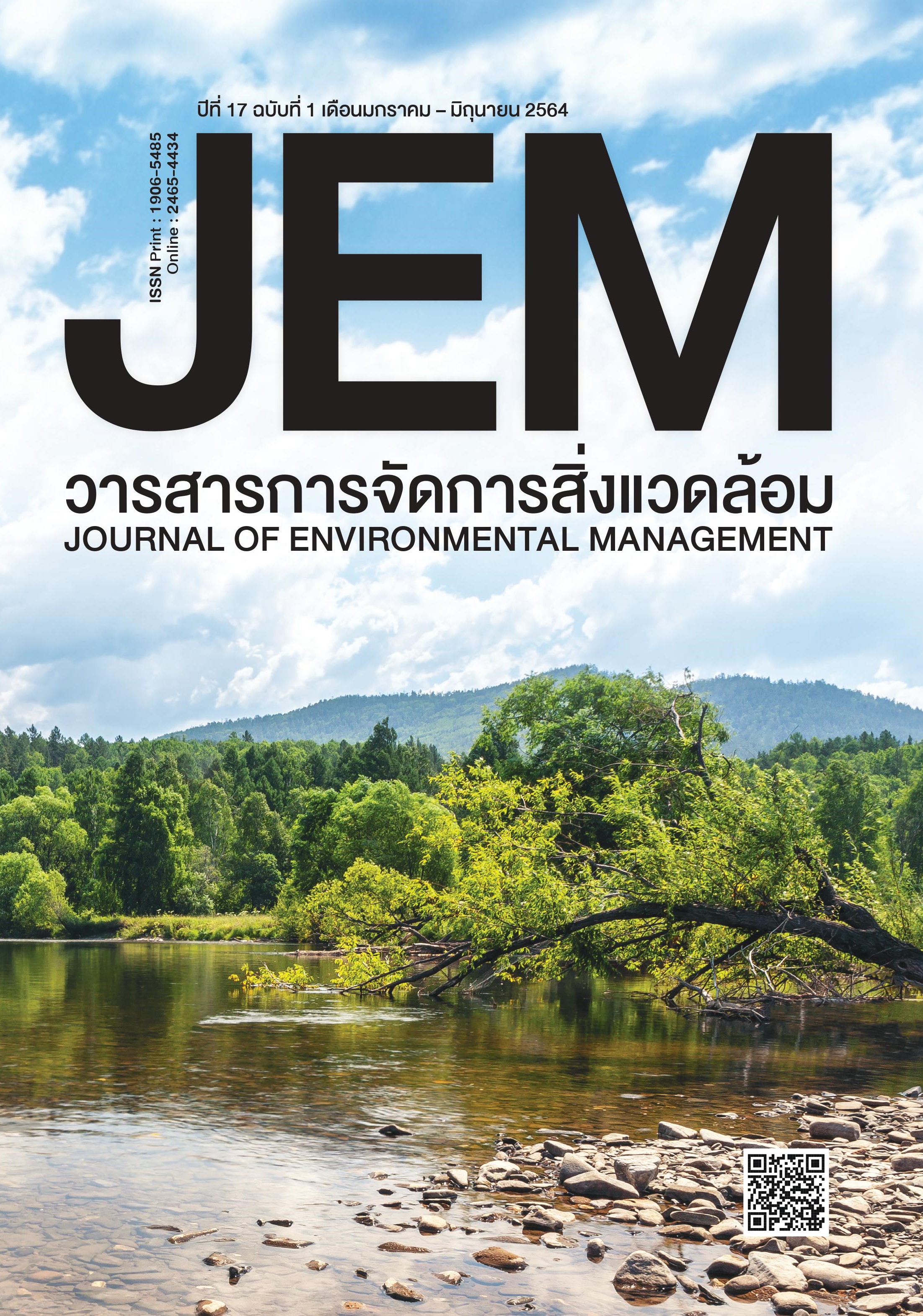แนวทางการฟื้นฟูแหล่งน้ำอย่างยั่งยืน ชุมชนริมกว๊านพะเยา
DOI:
https://doi.org/10.14456/jem.2021.5คำสำคัญ:
การฟื้นฟูแหล่งน้ำ, การจัดการน้ำแบบบูรณาการ, กว๊านพะเยาบทคัดย่อ
งานวิจัยนี้มีวัตถุประสงค์เพื่อศึกษาปัญหาการจัดการแหล่งน้ำ และเพื่อเสนอแนะแนวทางในการฟื้นฟูแหล่งน้ำอย่างยั่งยืนสำหรับชุมชนริมกว๊านพะเยา โดยใช้วิธีการวิจัยเชิงคุณภาพที่มีการเก็บข้อมูลด้วยการวิจัยเอกสาร การสำรวจพื้นที่ และการสัมภาษณ์แบบกึ่งโครงสร้าง และมีการวิเคราะห์ข้อมูลด้วยการวิเคราะห์เชิงเนื้อหาเกี่ยวกับสาเหตุที่ทำให้แหล่งน้ำเสื่อมโทรม แนวทางที่ประสบความสำเร็จในการฟื้นฟูแหล่งน้ำ แนวทางปฏิบัติเพื่อการป้องกันน้ำท่วม การป้องกันการกัดเซาะของตลิ่ง การฟื้นฟูระบบนิเวศของที่ราบน้ำท่วมถึง และแนวทางการดำเนินงานด้านการฟื้นฟูแหล่งน้ำภายใต้แนวคิดการจัดการน้ำอย่างยั่งยืน
ผลการศึกษาพบว่า แหล่งน้ำกว๊านพะเยามีการสะสมของตะกอนและการปนเปื้อนของสารเคมีทำให้คุณภาพน้ำเสื่อมโทรม นอกจากนี้ชุมชนริมกว๊านยังประสบปัญหาน้ำท่วมและน้ำแล้ง ปัญหาด้านการบริหารจัดการน้ำแบบแยกส่วน และการขาดการบูรณาการในการจัดการน้ำแบบองค์รวมและยั่งยืน สำหรับแนวทางในการฟื้นฟูแหล่งน้ำที่ได้เสนอสำหรับการศึกษานี้ ได้แก่ การประยุกต์ใช้แนวทางระบบสาธารณูปโภคสีเขียว การรักษาพืชพื้นเมืองริมตลิ่งเพื่อลดการปนเปื้อนในแหล่งน้ำ การป้องกันการกัดเซาะของตลิ่ง การฟื้นฟูโครงสร้างของแหล่งน้ำ การมีส่วนร่วมของชุมชนในโครงการฟื้นฟูแหล่งน้ำ การวางแผนการใช้ที่ดินและการจัดการน้ำแบบองค์รวม
เอกสารอ้างอิง
Ashton, P. (2000). Integrated Catchment Management: Balancing Resource Utilization and Conservation. African Water Issues Research Unit Occasional Paper, (5). Retrieved from http://awiru.co.za/pdf/astonpeter.pdf.
Amos, D. (2019). “An Intro to Urban Wastewater Systems”. Accessed November 2, 2019. Retrieved from https://www.youtube.com/watch?v=-HkRkCXPjzw&t=465s&ab_channel=CityBeautiful.
Bosselmann, K. (1995). When two worlds collide: Society and ecology. Ponsonby, Auckland: RSVP Publishing Company Limited.
Burdon, P. D. (2011). Earth jurisprudence: private property and earth community. (Doctoral dissertation, University of Adelaide).
Capra, F. (1996). The web of life: A new scientific understanding of living systems. Random House Digital, Inc..
Convention on Biological Diversity [CBD]. (2013). Article 2: Use of Terms. Retrieved from http://www.cbd.int/convention/articles/default.shtml?a=cbd-02.
Environmental Protection Agency [EPA]. (2000). Low Impact Development (LID) A Literature Review. Accessed April 29, 2018. Retrieved from http://water.epa.gov/polwaste/green/upload/lid.pdf.
Forest Service. (2014). “RESTORE Series: Tree-Tipping”. Accessed March 24, 2019. Retrieved from https://www.youtube.com/watch?v=AnTI6t9qLsc&list=LLPKCo0hYVT74Ldj3pogUEpw&index=26.
Haddad, B. M. (2003). Property rights, ecosystem management, and John Locke's labor theory of ownership. Ecological Economics, 46(1), 19-31.
Hermoso, V., Pantus, F., Olley, J. O. N., Linke, S., Mugodo, J., & Lea, P. (2012). Systematic planning for river rehabilitation: integrating multiple ecological and economic objectives in complex decisions. Freshwater Biology, 57(1), 1-9.
Hillman, M., & Brierley, G. (2005). A critical review of catchment-scale stream rehabilitation programmes. Progress in Physical Geography, 29(1), 50-76.
Hughes, F. M., & Rood, S. B. (2003). Allocation of river flows for restoration of floodplain forest ecosystems: a review of approaches and their applicability in Europe. Environmental Management, 32(1), 12-33.
Lovelock, J. E. (2010). The Vanishing Face of Gaia: The Final Warning. Public Affairs
Mondal, S., & Patel, P. P. (2018). Examining the utility of river restoration approaches for flood mitigation and channel stability enhancement: a recent review. Environmental earth sciences, 77(5), 195.
Newcomer Johnson, T. A., Kaushal, S. S., Mayer, P. M., Smith, R. M., & Sivirichi, G. M. (2016). Nutrient retention in restored streams and rivers: A global review and synthesis. Water, 8(4), 116.
Newson, M. D., & Newson, C. L. (2000). Geomorphology, ecology and river channel habitat: mesoscale approaches to basin-scale challenges. Progress in Physical Geography, 24(2), 195-217.
Nueces River Authority. (2015). “The Importance of Riparian Vegetation.” Accessed April 29, 2018. Retrieved from https://www.youtube.com/watch?v=W2x7K8hEIUU.
Oklahoma St. University. (2014a). “Natural Stream Restoration: Streams in Nature (Part I)” Accessed April 21, 2019. Retrieved from https://www.youtube.com/watch?v=CsayzeejVzY&t=18s.
Oklahoma St. University. (2014b). “Natural Stream Restoration: Good Stream Gone Bad (Part II)” Accessed April 21, 2019. Retrieved from https://www.youtube.com/watch?v=DsRkT8AegwY.
Phayao Municipality. (2018). Overview of Phayao Municipality. [In Thai]. Accessed January 15, 2019. Retrieved from http://www.tessabanphayao.go.th.
Prince George's County, M. (1999). Low-Impact Development Design Strategies: An Integrated Design Approach. Largo, MD: Department of Environmental Resources, Programs and Planning Division.
Takace, D. (1996). The idea of biodiversity: philosophies of paradise. Johns Hopkins University Press
ThaiTambon.com. (2016). Tambon Mae Sai, Amphoe Mueang Phayao. [In Thai]. Accessed October 21, 2019. Retrieved from http://measai.blogspot.com/2016/03/blog-post.html
Tippett, J. (2001). Integrated Catchment Management and Planning for Sustainability-The Case of the Mersey Basin Campaign (Doctoral dissertation, the University of Manchester).
U.S. Environmental Protection Agency. (2009). “Restoration with Native Plants”. Accessed March 24, 2019. Retrieved from https://www.youtube.com/watch?v=V4K0YejvgAA.
University of Phayao, School of Information and Communication Technology. (2014). Map of satellite imagery of district areas around Kwan Phayao. Accessed March 6, 2021. Retrieved from http://www.phayaolake.ict.up.ac.th/content/21.
Washington Department of Ecology. (2013). “Restoring Riparian Areas in the Palouse Region.” Accessed April 29, 2018. Retrieved from https://www.youtube.com/watch?v=4CXjngxoQRs.
Washington State University Clark County Extension [WSUClarkCo]. (2013). “5 Ways to Protect Riparian Areas.” Accessed April 29, 2018. Retrieved from https://www.youtube.com/watch?v=FYJnum1pE0s.



